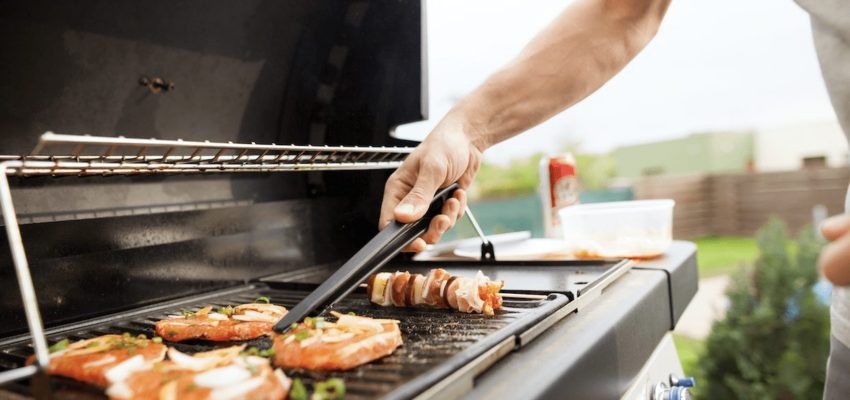Grilling Safety Tips

Summer is here — time to fire up the grill! While we know that summer cookouts can be a great way to gather friends and family, we also know that they pose serious fire risks if not done properly. According to the National Fire Protection Association, firefighters respond to an average of 9,600 home fires involving grills every year. So before you plan the menu for your next barbeque, take a moment to brush up on these important safety tips.
General Grilling Safety Tips
1) Consider Grill Placement
When setting up your grill, make sure you have at least 10 feet between your grill and any structures, like your home or garage. You grill should also be set up on a flat surface and away from things like overhanging trees, bushes, or any other flammable items.
2) Create a Grilling Zone
Children under 5 generally account for around one third of all grill burn accidents annually, which is why having a grilling zone is a great idea. Don’t let children or pets enter the area directly around your grill to minimize their risk of an accident.
3) Make Regular Cleaning a Habit
Built up grease and fat on grills can increase your risk of a fire, so make sure to clean your grill regularly. Be cautious if you use metal wire brushes to clean your grill — these can leave bristles stuck to your grill grates, which can then end up in your food.
4) Have the Right Gear
Long handed utensils designed for grilling will help you minimize your risk of grease splatter or burning yourself. Flame retardant mitts are also helpful. You should dress appropriately as well — avoid loose or frilly clothing that could fall into the fire.
5) Be Prepared
Remember, you should never use water to put out a grease fire. Instead, use sand or baking soda. Having a fire extinguisher nearby is also a great idea. And this should go without saying, but never leave a lit grill unattended!
Specific Tips for Gas vs Charcoal Grills
Gas Grills
Before firing up your gas grill for the first time this season, make sure all connections between your propane tank and your grill are tight and secure. Check for leaks as well. An easy way to do this is by filling a spray bottle with a simple solution of soap and water. Spray this over your propane tank hose and turn the gas on — if bubbles form anywhere, you have a leak. Get your grill serviced before using it if this is the case.
You should never light a gas grill when the top of your grill is down. This could lead to a gas buildup, which could result in an explosion. Once you’re done cooking, make sure your grill is completely off. Store your grill and propane tanks outside, never in your home or garage.
Charcoal Grills
If you plan to use a starter fluid to get your charcoal grill going, only use charcoal starter fluid, never gasoline or kerosene. Starter fluid should only be applied before lighting your coals — do not apply more starter fluid to lit coals as this could create a flash fire.
The most important thing to remember with your charcoal grill is that it will remain hot for several hours after you finish grilling, so it’s important to always keep children, pets, and combustible items away from your grill. Let the coals cool completely before safely disposing of them in a metal container.
We hope these tips help make your next barbeque even better. For more advice on protecting yourself and your home, feel free to connect with a local Bearingstar Insurance agent today: http://bit.ly/2GvLIQX
Back to Blog